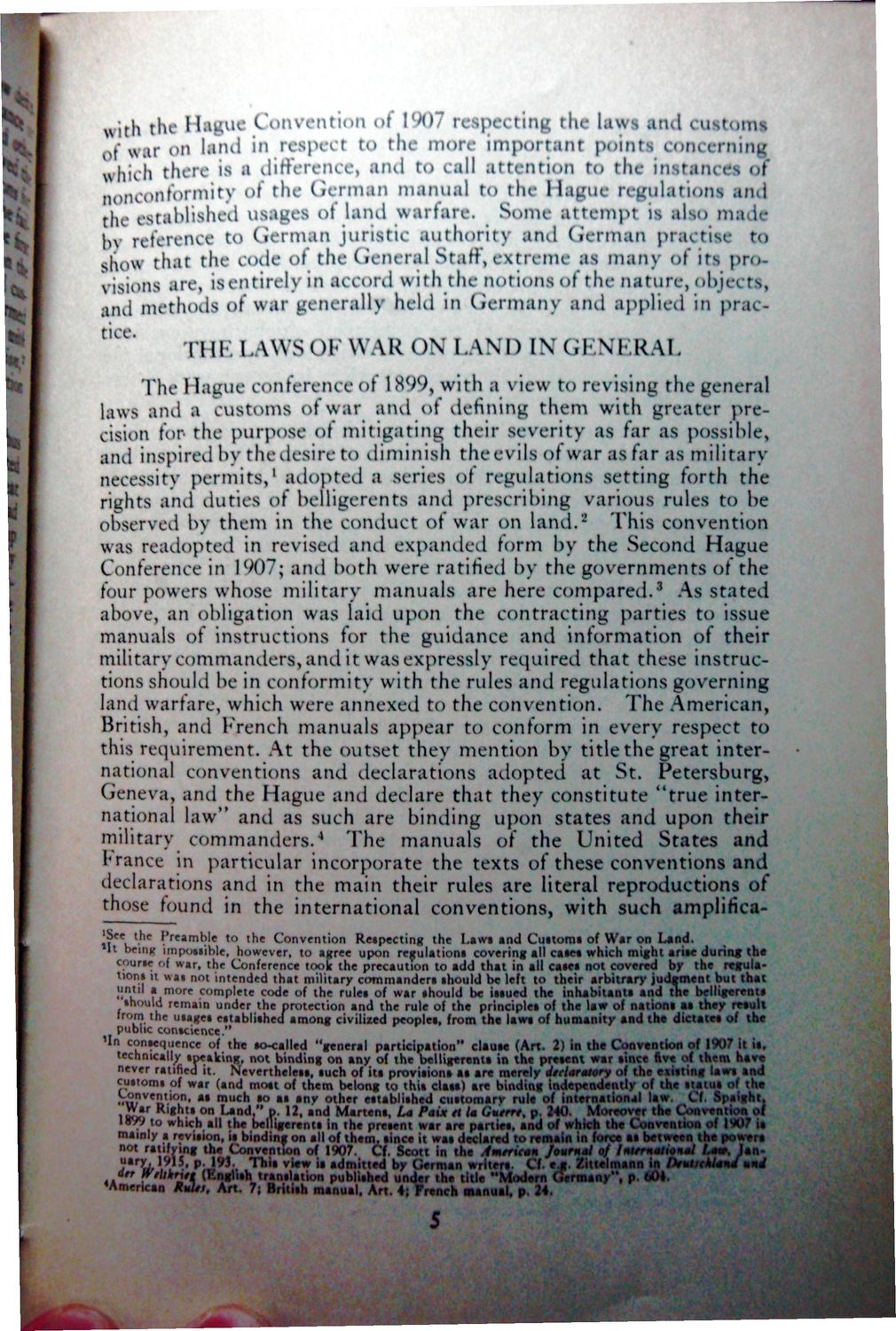| |
| |
Caption: War Publications - WWI Compilation 1923 - Article 14
This is a reduced-resolution page image for fast online browsing.

EXTRACTED TEXT FROM PAGE:
with the Hague Convention of P 0 7 respecting the laws and customs 0t*war on lan<J in respect to the more important points concerning which there is a difference, and to call attention to the instances of nonconformity of the German manual to the I [ague regulation! and the established usages of land warfare. ^ Some attempt is also madr In reference to German juristic authority anil German practise to show that the code of the General Staff, extreme as many of its pro\ isioni are, is entirely in accord frith the notions of the nature, objects, and methods of war gcncralU held in Germany and applied in practkC ' T i l l . LAWS OK WAR ON LAND IN (iKNKRAL The I lague conference of I S99> with a view to revising the general laws and a customs of war and of defining them with greater precision for the purpose of mitigating their severity as far as possible, and inspired by the desire to diminish the evils of war as far as military 1 necessity permits, adopted a series of regulations setting forth the rights and duties of belligerents and prescribing various rules to be 2 observed by them in the conduct of war on land. This convention was readopted in revised and expanded form by the Second Hague Conference in 1907} and both were ratified by the governments of the 3 four powers whose military manuals are here compared. As stated above, an obligation was laid upon the contracting parties to issue manuals of instructions for the guidance and information of their military commanders, and it was expressly required that these instructions should be in conformity with the rules and regulations governing land warfare, which were annexed to the convention. The American, British, and F/ench manuals appear to conform in every respect to this requirement At the outset they mention by title the great international conventions and declarations adopted at St. Petersburg, Geneva, and the Hague and declare that they constitute "true international law" and as such are binding upon states and upon their 4 military commanders. T h e manuals of the United States and France in particular incorporate the texts of these conventions and declarations and in the main their rules are literal reproductions of those found in the international conventions, with such amplificajSce the Preamble to the Convention Respecting the Laws and Customs of War on Land. It being impossible, however, to agree upon regulations covering all cases which might arise during the course of war, the Conference took the precaution to add that in all cases not covered by the regulations it Hascnot intended that military commanders should be left to their arbitrary judgment but that mor «u *, complete code of the rules of war should be issued the inhabitants and the belligerents should remain under the protection and the rule of the principles of the law of nations as they result from the usages established among civilized peoples, from tht laws of humanity and tht dictates of the public conscience." 'In consequence of the so-called "general participation" clause (Art. 2) in the Convention of 1907 it is, technically speaking, not binding on any of the belligerents in the present war since five of them have never ratified it. Nevertheless, such of its provisions as are merely declaratory of the existing laws and customs of war (and most of them belong to this class) arc binding independently of the status of the 0 11 mucn i n otncr JrSI^nV . * *• *° • • y established customarv rule of international law. Cf. Spaight, r iflo2 R>*hu on Land" p. 12, and Martens, La Paix et la Guerre, p. 240. Moreover the Convention of i w to which, all the belligerents in the present war are parties, and of which the Convention of IV07 is mainly a revision, is binding on all of them, since it was declared to remain in force as between the powers n0t 1 the "VlV/ * Convention wof 1907. Cf. Scott in the American Journal of International Law, IanThi| vit uaTk'.VV P ; J ^ \ »• admitted by German writers. Cf. ejj. Zittelmann in Deuttcklandund der fr'ltkriet (English translation published under . 1 . . »i»U " U u U m Germany", p 60*. WeltkrUt (Kndlih Uftr.tlalw.it mikK.ti*,! ,,„.l.r the title "Modern rf.rminv" n U)l •American Rules, Art. 7; British manual. Art. 4; French manual, p. 24. 5
| |